Contents
| |||||
| Decades: | |||||
|---|---|---|---|---|---|
| See also: | Other events of 2019 Years in Iran | ||||
Events in the year 2019 in Iran .
| |||||
| Decades: | |||||
|---|---|---|---|---|---|
| See also: | Other events of 2019 Years in Iran | ||||
Events in the year 2019 in Iran .

| | This section needs expansion. You can help by adding to it. (July 2019) |


Sayyed Mohammad Hosseini Beheshti was an Iranian jurist, philosopher, cleric and politician who was known as the second person in the political hierarchy of Iran after the Revolution. Beheshti is considered to have been the primary architect of Iran's post-revolution constitution, as well as the administrative structure of the Islamic republic. Beheshti is also known to have selected and trained several prominent politicians in the Islamic Republic, such as former presidents Hassan Rouhani and Mohammad Khatami, Ali Akbar Velayati, Mohammad Javad Larijani, Ali Fallahian, and Mostafa Pourmohammadi. Beheshti also served as the Secretary General of the Islamic Republic Party, and was the head of the Iranian judicial system. He further served as Chairman of the Council of Islamic Revolution, and the Assembly of Experts. Beheshti earned a PhD in philosophy, and was fluent in English, German and Arabic.
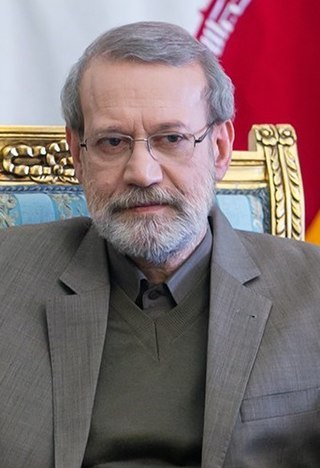
Ali Ardeshir Larijani is an Iranian moderate politician, philosopher and former military officer in the Islamic Revolutionary Guard Corps, who served as the Speaker of the Parliament of Iran from 2008 to 2020. He has been a member of the Expediency Discernment Council since 2020, having previously served from 1997 to 2008. Larijani is a candidate for president of Iran in the 2024 presidential election. He previously ran in 2005, but was disqualified from running in 2021.

Mohammad Bagher Ghalibaf is an Iranian conservative politician, former military officer, and current Speaker of the Parliament of Iran since 2020. He held office as the Mayor of Tehran from 2005 to 2017. Ghalibaf was formerly Iran's Chief of police from 2000 to 2005 and commander of the Revolutionary Guards' Air Force from 1997 to 2000.

Mohammad-Hossein Saffar-Harandi is an Iranian politician who was minister of culture and Islamic guidance of Iran from 21 August 2005 until 23 July 2009 when he resigned after opposing the appointment of Esfandiar Rahim Mashaei as vice president. He is currently member of the Expediency Discernment Council.

Hassan Abbasi is an Iranian conspiracy theorist and an Islamic Revolutionary Guard Corps officer who heads its think-tank 'Center for Borderless Security Doctrinal Analysis'. Abbasi is primarily known for his conspiracy theories, and for delivering controversial speeches on issues including economics, history, politics and cinema.

The Imam Sadiq University is an Islamic private university in Tehran, Iran. Established in 1982, the goal of the university is to bridge the gap between Islamic research and modern studies, especially humanities. The university was dedicated to training politicians and jurists preaching Islam. Reflecting its commitment to Islamic principles, the university separates educational environments for female and male students.

Sadeq Ardeshir Larijani, better known as Amoli Larijani, is an Iranian scholar, conservative politician, and current chairman of Expediency Discernment Council. He is the former and fifth Chief Justice of the judicial system of Iran after the 1979 revolution.

Saeed Jalili is an Iranian politician and diplomat, who was secretary of the Supreme National Security Council from 2007 to 2013. He is currently a member of the Expediency Discernment Council, and is the former nuclear negotiator for Iran.
Events in the year 2012 in the Islamic Republic of Iran.
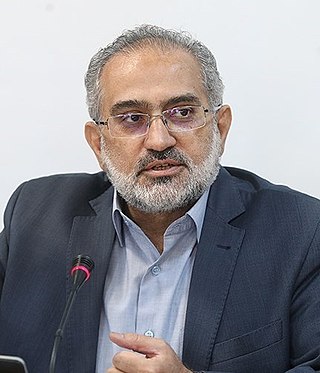
Mohammad Hosseini is an Iranian politician, who served as the vice president for parliamentary affairs in the cabinet of Ebrahim Raisi from 2021 to 2024.
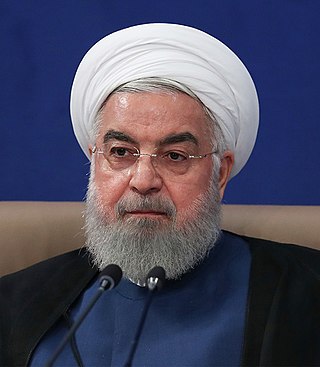
Hassan Rouhani is an Iranian politician who served as the seventh president of Iran from 2013 to 2021. He is also a sharia lawyer ("Wakil"), academic, former diplomat and Islamic cleric. He served as a member of Iran's Assembly of Experts from 1999 to 2024. He was a member of the Expediency Council from 1991 to 2013, and also was a member of the Supreme National Security Council from 1989 to 2021. Rouhani was deputy speaker of the fourth and fifth terms of the Parliament of Iran (Majlis) and Secretary of the Supreme National Security Council from 1989 to 2005. In the latter capacity, he was the country's top negotiator with the EU three, UK, France, and Germany, on nuclear technology in Iran, and has also served as a Shia mujtahid, and economic trade negotiator.
The following lists events that happened during 2013 in the Islamic Republic of Iran.
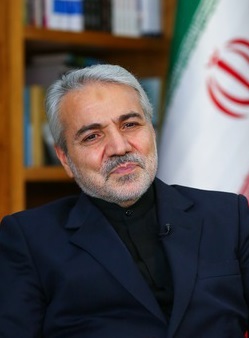
Mohammad Bagher Nobakht Haghighi is an Iranian politician and economist. He was Hassan Rouhani's advisor for Supervision and Strategic Affairs and also was the Head of Plan and Budget Organization from 2016 to 2021. He was Spokesman of the Government from 2013 to 2018. He is also the former Head of Management and Planning Organization and secretary-general of the Moderation and Development Party.

Abdolreza Rahmani Fazli is an Iranian conservative politician and interior minister of Hassan Rouhani's government. He was the president of Supreme Audit Court from 2008 to 2013.

Mohammad Nahavandian is an Iranian politician and economist who served as the Vice President for Economic Affairs. He was formerly Chief of Staff of the President of Iran, serving from 2013 until 2017.
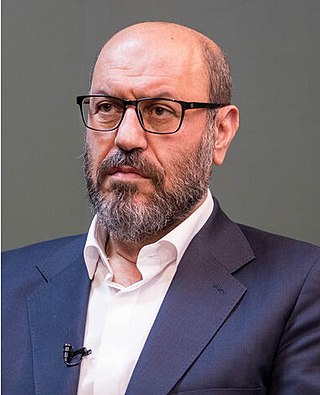
Hossein Dehghani Poudeh, commonly known as Hossein Dehghan, is an Iranian military officer and former IRGC Air Force officer with the rank of brigadier general. He is currently head of the Mostazafan Foundation since 2023.
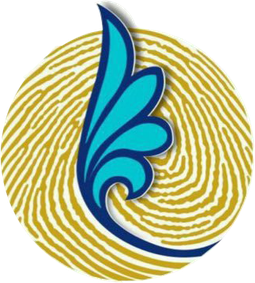
Pervasive Coalition of Reformists: The Second Step, named The List of Hope by Mohammad Khatami, was the sole coalition and electoral list affiliated with the Iranian reform movement for the 2016 legislative election. The group also endorsed candidates for the 2016 Assembly of Experts election. Reformists backed a list of 236 candidates for the Parliament and 77 for the Assembly of Experts, even though many of them are not reformists but moderate-leaning figures.

Hassan Rouhani, the incumbent president of Iran, launched his reelection campaign for the presidential office in February 2017. The election itself and related events received international media attention with many issues being raised. Rouhani achieved a decisive victory after the May 2017 vote, with Interior Minister Abdolreza Rahmani Fazli announcing that out of 41.3 million total votes cast Rouhani got 23.6 million. Ebrahim Raisi, Rouhani's closest rival, had picked up 15.8 million votes in contrast.

The 2017 Tehran attacks were a series of two simultaneous terrorist attacks that occurred on 7 June 2017 that were carried out by five terrorists belonging to the Islamic State of Iraq and the Levant (ISIL) against the Iranian Parliament building and the Mausoleum of Ruhollah Khomeini, both in Tehran, Iran, leaving 17 civilians dead and 43 wounded. The shootings were the first terrorist attacks in Tehran in more than a decade, and the first major terror attack in the country since the 2010 Zahedan bombings.
On February 13, 2019, a suicide bombing on the Khash–Zahedan road in Sistan and Baluchestan Province of Iran killed at least 27 Revolutionary Guards and wounded another 13. It was one of the deadliest terrorist attacks in Iran in years. The Salafi jihadist militant organization Jaish ul-Adl said it carried out the bombing.